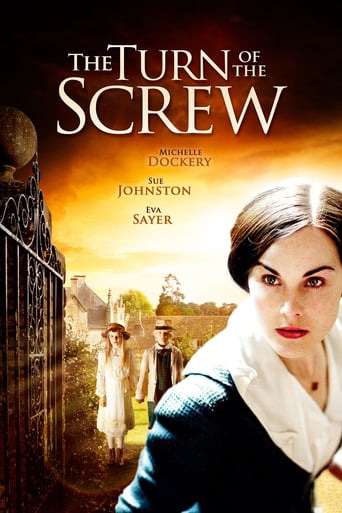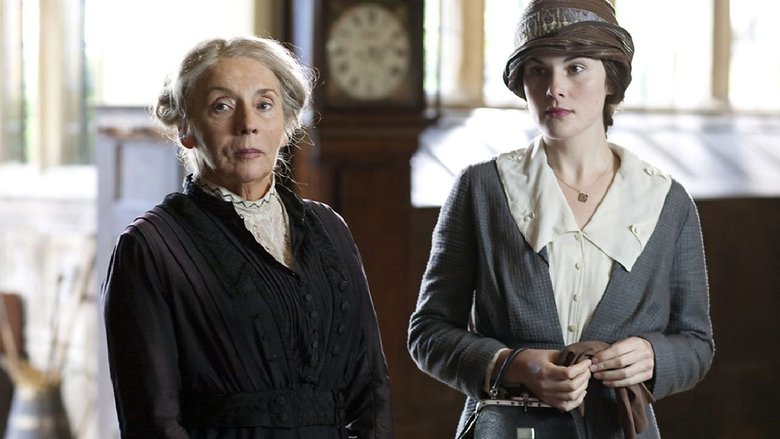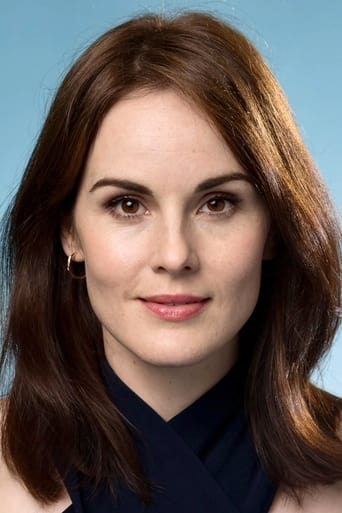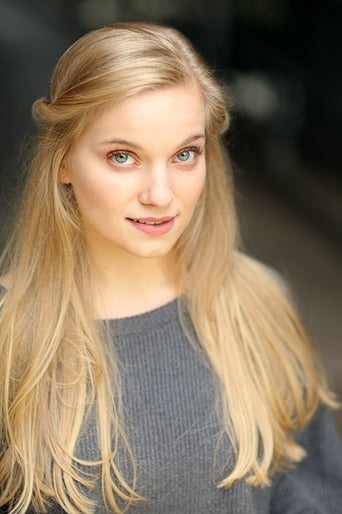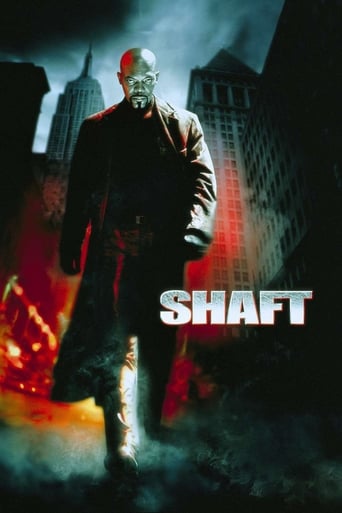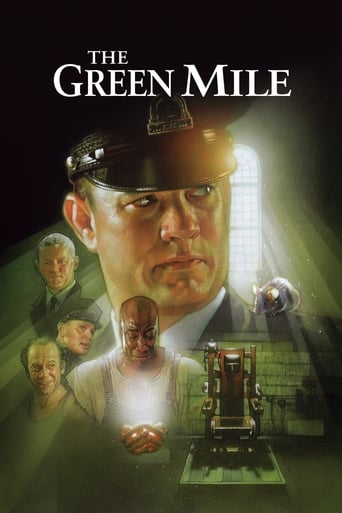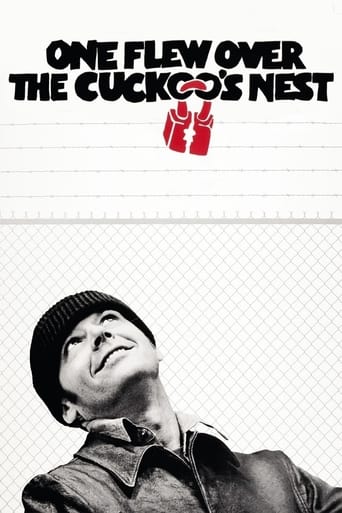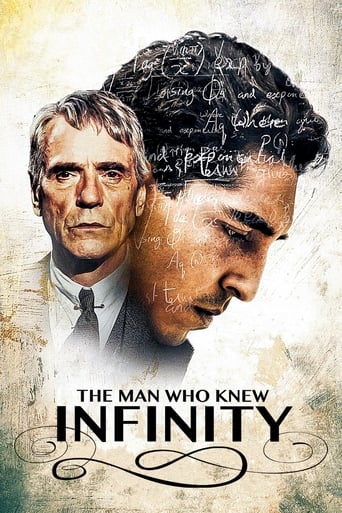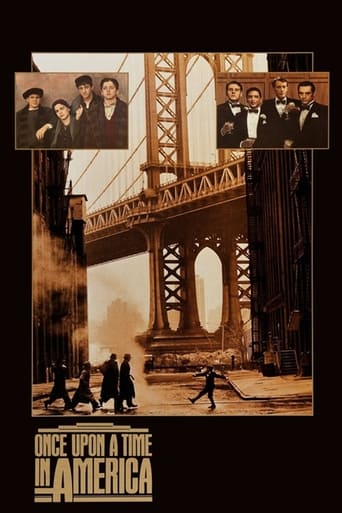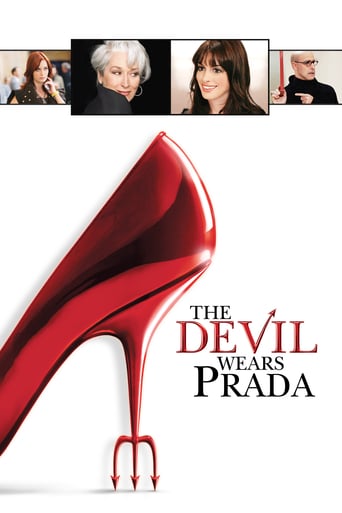The Turn of the Screw (2009)
A young governess, Ann, is sent to a country house to take care of two orphans, Miles and Flora. Soon after her arrival, Miles is expelled from boarding school. Although charmed by her young charge, she secretly fears there are ominous reasons behind his expulsion. With Miles back at home, the governess starts noticing ethereal figures roaming the estate's grounds. Desperate to learn more about these sinister sightings she discovers that the suspicious circumstances surrounding the death of her predecessor hold grim implications for herself. As she becomes increasingly fearful that malevolent forces are stalking the children the governess is determined to save them, risking herself and her sanity in the process.
Watch Trailer
Free Trial Channels
Cast


Similar titles
Reviews
Masterful Movie
an ambitious but ultimately ineffective debut endeavor.
True to its essence, the characters remain on the same line and manage to entertain the viewer, each highlighting their own distinctive qualities or touches.
There are moments in this movie where the great movie it could've been peek out... They're fleeting, here, but they're worth savoring, and they happen often enough to make it worth your while.
Has everyone forgotten the adaptation of Turn of the Screw starring Ingrid Bergman and filmed for television in 1959? It was shown in the USA and on BBC in Britain. Bergman was brilliant ,of course!and the two children were also excellent. I have forgotten who played Quint or any of the other parts and shall search for it. My point here is: don't assume the most recent adaptation of anything is the best. Usually it is not - for example Far from the Madding Crowd 1967 is 100% better than the recent version.
This filmed version of James' novella is a travesty. It begins with the conceit of the insane asylum, in which the Governess is an inmate, as if this were an acceptable or even clever way to evoke the issue of her questionable sanity. The shots and cuts seem to be meant to reinforce this simplistic kind of ambiguity, certainly with none of the subtlety of James' work, and sometimes even to opposite effects, and often garishly. For example, when the Governess first arrives at Bly, she is greeted by the staff. The camera pans over their faces and cuts to close-ups of especially sour-looking expressions in order to make us wonder whether this is really such a nice place, or perhaps that some of these unhappy people may wish her harm. To get at the latent sexuality of the text, this filmed version relies on a piece of lingerie, flashbacks of Quint atop Jessel in bed, and the Governess' fantasies of her and the uncle in various hackneyed romantic gestures. Mrs. Grose's rosy, innocent, and reliable sympathy with the Governess in the novel has been eradicated here and replaced with her somewhat cold rejection of the Governess' claims to have seen Quint and Jessel.There's more. The music has been expediently installed to cue the intended emotional responses. The dialogue and characterizations, with their overwrought emotion, are both anachronistic and unconvincing, and get worse as the film wears on, ending with the children's swearing at the Governess, a device that's just plain tacky, and Miles' pummeling Flora, slapping her face and calling her the b-word before he dunks her head into the water of the lake. This is how the filmmakers attempt to answer the question, What harm might Quint and Jessel intend for the children? Why, to make the children into likenesses of themselves of course! Hence, at the end, Miles kisses the Governess passionately, while the image of the actor who plays Quint is superimposed over him.It's not clear to me why so much of what's produced for television is so poorly done. If the producers and directors are dumbing their work down for wider audiences, then they ought to give us more credit. If they themselves are such poor interpreters of literature, then they should be given other projects, or discharged. Or haunted by Peter Quint and Miss Jessel, and Henry James himself!
I agree with all of the previous four reviews here. Like another reviewer, I have been looking forwards to seeing this - absolutely LOVE 'The Innocents' and was curious as to how a contemporary film maker would interpret this. It aired as part of Christmas / New Year viewing in Australia on Foxtel's UK Channel.Where to begin?? Thought there was trouble brewing when it began in the asylum. Straight away the audience is given 'markers' as to how we are to interpret or 'read' this television film. To me, the story's power is it's AMBIGUITY! Immediately, this is undercut.Okay, they have decided to swap the setting to 1922 rather than Victorian England. Was willing to play along and give the film makers the benefit of the doubt, but alarm bells are going off. After all, Gothic and 19th Century England just go so beautifully don't they?! Quite apart from the fact that this is the historical period in which the novel is set. I have no problem with films and television programmes providing viewers with fresh contexts, but swapping the historical period was always going to be difficult. But no matter, I persevered. What really REALLY annoyed me - in no particular order:SPELLING EVERYTHING OUT. You know those B grade made for television (often Hallmark) films where the characters are given ridiculous lines of dialogue telling you everything - in case you might get to use your imagination and try to work something out for yourself? Well, you will recognise this modus operandi here. The sinister mysterious figure of the male that the governess 'sees' - transformed into a panto villain who keeps doing the 'HA HA HA!!!!' laugh. Spare us. Not scary, just irritating.The 'oh look at ye governess, she be havin' sexual fantasies about Master' scenes. What makes the original story so effective is the general repression of the Victorian era. The style of Gothic in literature has been interpreted as a way to express that which was repressed in the Victorian era. For example: see 'Wuthering Heights' amongst others. All feature violent, sexual, usually dark haired men - (Heathcliffe is a classic). The viewer should never be completely sure of how the governess is feeling about the male characters. This is about repression, not telling. That ancient gravestone when the Governess and the Housekeeper (Oh Sue Johnston - I love your work, but how in God's name did you get involved in this?) are supposed to be looking at the previous Governesses gravestone. She is only meant to have died recently and this gravestone looks like it's been there for centuries. A small goof perhaps, but this nicely sums up the general sloppiness. The poor child actors - pity them. They have no idea what is going on here at all. Suspect they were turning up for work in Studio 1 for a new version of 'Village of the Damned' but walked into Studio 2 by mistake, ending up in this. If you want to see an evocative version of this story, go and find a copy of 'The Innocents' - watch it a couple of times and see how your idea of just what happened in this house continually changes. It opens up interpretation rather than shut it down and spell it out. It will make the hairs stand up on the back of your neck. This dogs dinner on the other hand will make you wonder why you bothered.
I first read Henry James' chilling ghost story at a young age and have seen different versions of it both on stage and film and so was very keen to see this latest version put forward by the BBC in their winter season.The key to the story, in my opinion, is the doubt on whose truth here is real. Indeed when I first read the novella in my youth, it never occurred to me that the ghosts weren't "real" and not possibly a figment of an over-emotional young woman's imagination. Re-reads and re-viewings of the piece have brought me round to this, I think, intended more ambivalent (and ultimately satisfying) interpretation so that I was disappointed that that this high-production-value version seemed to cleave so much to the former viewpoint, i.e. that the malevolent spirits were real - this evidenced by the ghosts "appearing" in the imagination, for example of the young doctor who attempts to understand and salve the troubled mind of the disturbed young governess.Another source of confusion and disappointment was the transposition of events to post-First World War England. If the lead character had been a young man, just back from and possibly their mind affected by the war, then a case for this change of context, could be argued. In every other respect though, the film plays as if in a 19th Century time-line thus throwing the narrative off-kilter. I could also have done without the sub-Lady Chatterley cavortings of both the governess in her imagination with her new employer (who, good looks apart and a self-confessed seducer of previous servants and governesses), hardly seems able to be responsible for her graphic fantasising, as well as the crudely physical liaison that the phantoms Quint and Jessell portray.The film takes this shock-Gothic outlook to extremes with scenes suggesting the actual possession of the children by their malefactors but it's all done in a very sub-"The Exorcist" way and in the end I felt it wrong to come down so conclusively on the side of the demons.The acting was mixed in quality, the children unable to portray the duality of their personalities convincingly and the actor playing Quint lacking menace entirely. However, Michelle Dockery, as the stricken governess, was convincing in both appearance and conviction, with the omnipresent Sue Johnston a sympathetic foil as the bemused house-matron.There were some scares deftly inserted along the way, punctuated effectively by well-crafted background music, but as I said earlier, the modernising of the story to include the nudity and violence depicted here, overpowered, to me anyway, the thin line between fantasy and reality that served the original book so well.A great story, lost somewhat in this particular re-telling.

